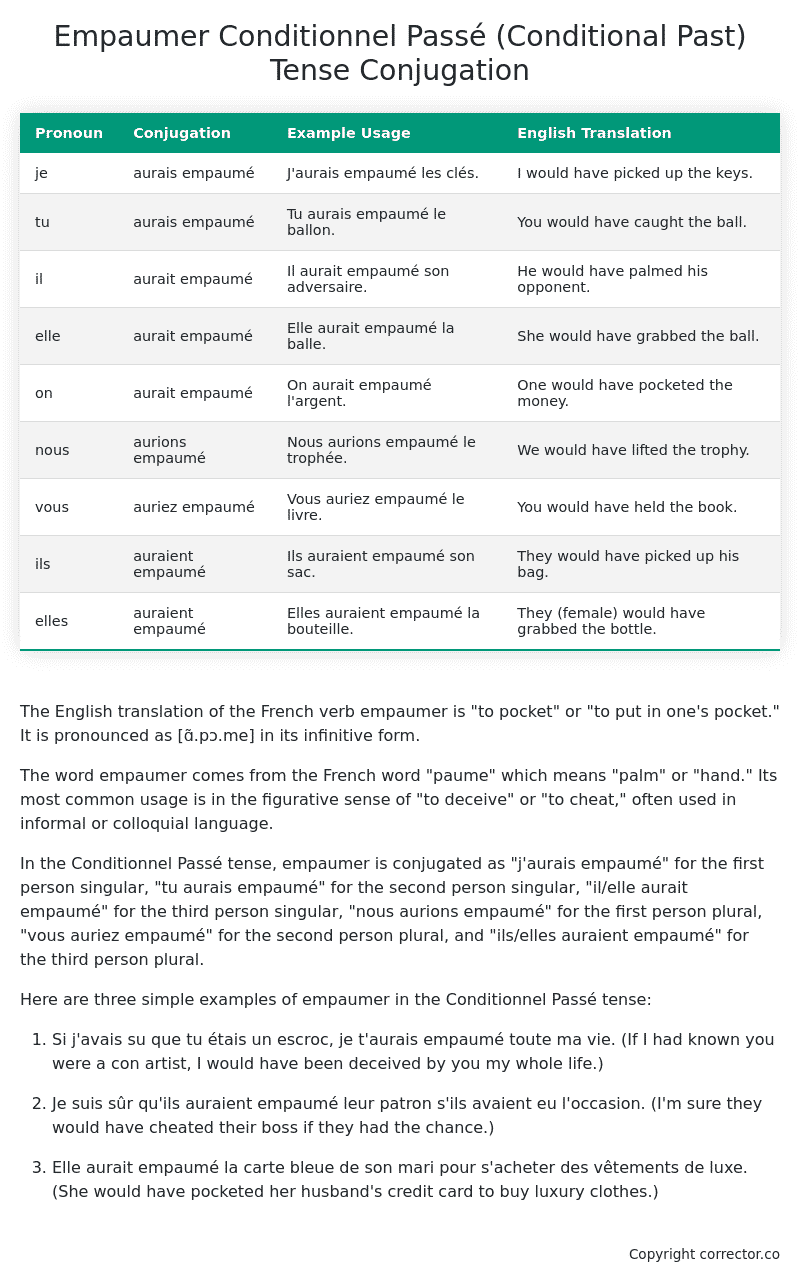Conditionnel Passé (Conditional Past) Tense Conjugation of the French Verb empaumer
Introduction to the verb empaumer
The English translation of the French verb empaumer is “to pocket” or “to put in one’s pocket.” It is pronounced as [ɑ̃.pɔ.me] in its infinitive form.
The word empaumer comes from the French word “paume” which means “palm” or “hand.” Its most common usage is in the figurative sense of “to deceive” or “to cheat,” often used in informal or colloquial language.
In the Conditionnel Passé tense, empaumer is conjugated as “j’aurais empaumé” for the first person singular, “tu aurais empaumé” for the second person singular, “il/elle aurait empaumé” for the third person singular, “nous aurions empaumé” for the first person plural, “vous auriez empaumé” for the second person plural, and “ils/elles auraient empaumé” for the third person plural.
Here are three simple examples of empaumer in the Conditionnel Passé tense:
-
Si j’avais su que tu étais un escroc, je t’aurais empaumé toute ma vie. (If I had known you were a con artist, I would have been deceived by you my whole life.)
-
Je suis sûr qu’ils auraient empaumé leur patron s’ils avaient eu l’occasion. (I’m sure they would have cheated their boss if they had the chance.)
-
Elle aurait empaumé la carte bleue de son mari pour s’acheter des vêtements de luxe. (She would have pocketed her husband’s credit card to buy luxury clothes.)
Table of the Conditionnel Passé (Conditional Past) Tense Conjugation of empaumer
| Pronoun | Conjugation | Example Usage | English Translation |
|---|---|---|---|
| je | aurais empaumé | J’aurais empaumé les clés. | I would have picked up the keys. |
| tu | aurais empaumé | Tu aurais empaumé le ballon. | You would have caught the ball. |
| il | aurait empaumé | Il aurait empaumé son adversaire. | He would have palmed his opponent. |
| elle | aurait empaumé | Elle aurait empaumé la balle. | She would have grabbed the ball. |
| on | aurait empaumé | On aurait empaumé l’argent. | One would have pocketed the money. |
| nous | aurions empaumé | Nous aurions empaumé le trophée. | We would have lifted the trophy. |
| vous | auriez empaumé | Vous auriez empaumé le livre. | You would have held the book. |
| ils | auraient empaumé | Ils auraient empaumé son sac. | They would have picked up his bag. |
| elles | auraient empaumé | Elles auraient empaumé la bouteille. | They (female) would have grabbed the bottle. |
Other Conjugations for Empaumer.
Le Present (Present Tense) Conjugation of the French Verb empaumer
Imparfait (Imperfect) Tense Conjugation of the French Verb empaumer
Passé Simple (Simple Past) Tense Conjugation of the French Verb empaumer
Passé Composé (Present Perfect) Tense Conjugation of the French Verb empaumer
Futur Simple (Simple Future) Tense Conjugation of the French Verb empaumer
Futur Proche (Near Future) Tense Conjugation of the French Verb empaumer
Plus-que-parfait (Pluperfect) Tense Conjugation of the French Verb empaumer
Passé Antérieur (Past Anterior) Tense Conjugation of the French Verb empaumer
Futur Antérieur (Future Anterior) Tense Conjugation of the French Verb empaumer
Subjonctif Présent (Subjunctive Present) Tense Conjugation of the French Verb empaumer
Subjonctif Passé (Subjunctive Past) Tense Conjugation of the French Verb empaumer
Subjonctif Imparfait (Subjunctive Imperfect) Tense Conjugation of the French Verb empaumer
Subjonctif Plus-que-parfait (Subjunctive Pluperfect) Tense Conjugation of the French Verb empaumer
Conditionnel Présent (Conditional Present) Tense Conjugation of the French Verb empaumer
Conditionnel Passé (Conditional Past) Tense Conjugation of the French Verb empaumer (this article)
L’impératif Présent (Imperative Present) Tense Conjugation of the French Verb empaumer
L’infinitif Présent (Infinitive Present) Tense Conjugation of the French Verb empaumer
Struggling with French verbs or the language in general? Why not use our free French Grammar Checker – no registration required!
Get a FREE Download Study Sheet of this Conjugation 🔥
Simply right click the image below, click “save image” and get your free reference for the empaumer Conditionnel Passé tense conjugation!

Empaumer – About the French Conditionnel Passé (Conditional Past) Tense
Formation
Common Everyday Usage Patterns
Expressing Unreal Past Scenarios
Polite Requests or Suggestions
Expressing Doubt or Uncertainty
Interactions with Other Tenses
Conditional Present
Indicative Past Tenses
Conditional Future
Summary
Want More?
I hope you enjoyed this article on the verb empaumer. Still in a learning mood? Check out another TOTALLY random French verb conjugation!


